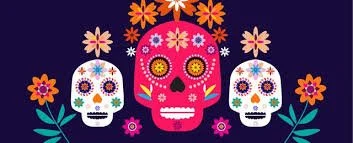Right on the heels of Halloween is the Día de los Muertos, or Day of the Dead. As a Spanish teacher among other things, I have taken a little closer interest of late in Latin American festivals and holidays. A little like Cinco de Mayo, Día de Muertos has gained more of a following in the United States and elsewhere, especially with the 2017 release of Disney's Coco.
A thousand years before the arrival of the Spaniards in Mexico, the Aztecs were honoring their ancestors with the presence of skulls. It was believed (and still is to some extent) that the spirit of the departed would return for a visit when he or she was honored. Enter the conquistadores, who took those traditions and consolidated them to coincide with the Catholic observance of All Saints Day on Nov. 1 and All Souls Day on Nov. 2. Some used Nov. 1 to specifically honor children who had died.
Until recently, before the broader acceptance of all things macabre and morbid by the general American population on Halloween, anything that used skulls and skeletons to celebrate would have been considered morose and anything BUT festive or celebratory. Whatever the case, I will be teaching my students about calaveras, the ubiquitous skulls that show up in all shapes and sizes on Día de Muertos.
(What English speakers may find interesting is that the word calavera simply comes from the Latin for "skull", calvaria. Christians will recognize the world "calvary", the anglicized name for the hill on which Jesus was crucified in Jerusalem. Golgotha (Aramaic), the "Place of the Skull". So if you go to Calvary Baptist Church, for example, I hate to tell you that you are a member of Skull Baptist Church.)
Back to Día de Muertos: What can we learn from this tradition beyond impressive makeup technique and creative costuming?
For my wife and myself, we're taking it as a reminder that we need to talk to our children (and grandchildren) about our forebears.
I must say I have few to no memories of my parents talking about their grandparents. And if I'm honest, my own grandparents were part of a Texas Panhandle culture I feel so far removed from.
But this shouldn't prevent me from talking about them -- and those stories won't always be sweet and rosy. My maternal grandfather was a barber who refused to cut the hair of blacks or Mexicans. But he was part of an entire culture rife with racism, which is an important context for our children to know about. There are also great things they should know about their ancestors, such as my paternal grandparents' curiosity about the world until the day they died.
If you're a parent or a grandparent, it is never too late to honor, with your children, those who have gone before, but perhaps they need to first be introduced to them.
Feliz Día de Muertos.
